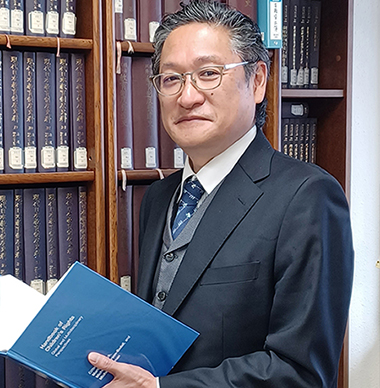GREETING

We hope to be the center of cooperation
and solidarity among all people
manager of centre
Nagoya University Graduate School of Education and Human Development professor
ISHII, Takuji
The concept of "Social Exclusion" has made visible the problems of inequality and disadvantage in society. The problems of child abuse and young carers deprive children of their rights to live safely and securely and of their rights to live as children, which should be guaranteed in childhood. Although the figures have improved somewhat in recent years, the problem of child poverty remains serious.
When we look at these issues, we strongly feel that we must now construct a framework for theoretical research that takes a cross-sectional view of education and welfare and responds to practical issues. First, there is a legal and institutional require for social inclusion. The Child Welfare Law has been revised, and the Child Abuse Prevention Law, the Law for Eliminating Discrimination against Persons with Disabilities, the Law for Measures to Cope with Child Poverty, the Law for Securing Opportunities for General Education, the Law for Supporting Higher School Education, the Law for Supporting Higher Education and Training, the Basic Sports Law, etc. have been enacted. The question is what kind of system will be designed and implemented in society.
Second, the enactment of these laws has also created new practical challenges for school education, social education facilities, and welfare facilities. It is an extremely important research issue to clarify the specific level of reasonable accommodation that must be ensured as stipulated in the Law for the Elimination of Discrimination against Persons with Disabilities. Everywhere, "regional transition of club activities" has become a policy issue. However, full-scale studies and research are needed on how the rights to enjoy sports and culture can be guaranteed and how to restore the rights of women and persons with disabilities, whose rights to sports and culture have not been adequately guaranteed in the past.
At this time, it is inevitable to avoid a conflict of rights over "social exclusion". Rather, it is precisely through these conflicts of rights that the level of human rights and entitlements has been constantly raised, and the progress of society and our standard of living and well-being has been enhanced. We would like to disseminate theories and ideas for the resolution of social issues such as conflicts and the coordination and mediation of rights at a higher level.
To this end, we must pursue a new level of consensus in based on new developments in international human rights law, such as the Convention on the Rights of the Child, the Convention on the Elimination of All Forms of Discrimination against Women, the Convention on the Elimination of All Forms of Racial Discrimination, and the Convention on the Rights of Persons with Disabilities. At the same time, we believe it is important to learn from the history of educational thought and educational movements that have opened up these new horizons. We hope to be the center of creating cooperation and solidarity with all people in various fields and domains, including government agencies, consultation organizations, medical institutions, educational and children's facilities, volunteers, NPOs, NGOs and other private organizations, labor and educational movement groups, and individuals who are working hard to support and work toward social inclusion of socially disadvantaged people.
PROJECT
- School Education
- With the issue of social exclusion in school education in mind, we will study theoretical and practical issues for social inclusion. We will elucidate various issues such as truancy, disability, gender non-conformity and SOGIE, race and nationality, poverty, and young carers. We will also look at the historical evolution of school education systems and the existence of educational ideologies and movements in Japan and abroad, and clarify the formation process of social foundations surrounding value ideals such as social inclusion and solidarity.
- Social & Lifelong Education
- We will investigate theoretical and practical issues surrounding social inclusion from the perspective of social and lifelong education. We will examine how to provide seamless support in school, social, and vocational education, including support for children, youth and persons with disabilities, as well as mechanisms to support smooth transition from school to work. While promoting cooperation with local governments, residents' groups, businesses, NPOs, and other private organizations, we will also focus on local government policy making and community development, learning and residents' movements, labor movements, and practices to provide university and higher education opportunities for persons with disabilities.
- Clinical Education
- We will focus on the situation of violation of children's rights, and investigate how to remedy children's rights and support children and their families. We will clarify how to cooperate with school education and social education facilities, child welfare facilities, children's rights advocacy organizations, medical institutions, and administrative agencies, as well as the status of institutional measures for school lawyers, school social workers, child advocates, etc. and their practical issues. In addition, we will deepen the value principles of the Convention on the Rights of the Child, monitor national laws and municipal ordinances on the rights of the child, as well as the installation status of children's rights organizations. We will also cooperate with overseas center for research in education and welfare and comprehensive child administration organizations to investigate the status of systems overseas.
- Sports & Environment
- Focusing on the role of sports in realizing human health and welfare, we will pursue specific systems, environments and conditions for guaranteeing the right to sports. In addition to investigating the status of regional transition and regional development of club activities, we will also address the issues of social exclusion of disabled persons and women from sports, as well as abuse and inappropriate coaching in sports situations. We will clarify the role of sports in human development through sports, the significance of circle activities (extracurricular activities) for children and adolescents, and the role of sports in social inclusion, solidarity, and community building.
